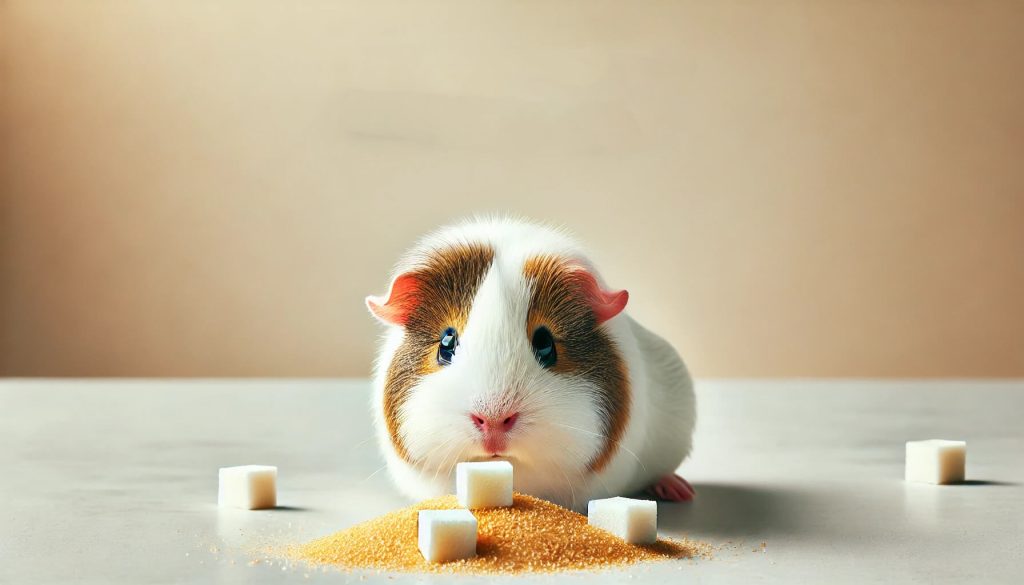
Can Guinea Pigs Eat Sugar?
Understanding Guinea Pig Diets
To ensure the well-being of your guinea pigs, understanding their nutritional needs are crucial. A balanced diet promotes their overall health.
The Basics of Nutrition for Guinea Pigs
Guinea pigs need a diet high in fiber, vitamin C, and low in fats and sugars. Fresh vegetables, hay, and specially-formulated pellets provide these essential nutrients.
- Fiber: Essential for digestion. Feed hay like timothy, orchard, or meadow hay.
- Vitamin C: Prevents scurvy since guinea pigs don’t produce it. Include bell peppers and leafy greens.
- Low in Fats and Sugars: Avoid fatty and sugary foods to prevent obesity and diabetes.
Common Foods and Their Benefits
Several foods support guinea pigs’ nutritional needs and overall health.
- Hay: Timothy hay is a staple. It aids digestion and keeps teeth in check.
- Vegetables: Leafy greens like kale and spinach. They provide fiber and vitamins.
- Pellets: Choose vitamin C-fortified pellets. These ensure a balanced intake.
- Fruits: Small amounts of fruits like apples and berries. These are occasional treats due to natural sugars.
By providing the right foods, you support your guinea pigs’ health and longevity.
Can Guinea Pigs Eat Sugar?
Guinea pigs should avoid sugar as it’s detrimental to their health. Understand the implications to keep your pet healthy.
Risks Associated with Sugar in a Guinea Pig’s Diet
Sugar leads to obesity and diabetes in guinea pigs. Unlike humans, guinea pigs can’t efficiently process sugar. Foods high in sugar content disrupt guinea pigs’ digestive systems and can cause gastrointestinal issues.
Excess sugar intake weakens guinea pigs’ immune systems. This increased vulnerability makes them more susceptible to infections and diseases. Veterinarians recommend avoiding sugary foods, even fruits with high sugar content like grapes and bananas.
Signs of Excessive Sugar Intake in Guinea Pigs
Increased hunger and thirst indicate excessive sugar intake. If your guinea pig’s eating habits change, this might be a cause.
Diarrhea and bloating are common in guinea pigs consuming too much sugar. Monitor their fecal consistency and belly size.
Lethargy and weight gain are serious signs. A lethargic guinea pig that gains weight rapidly likely consumes too much sugar.
Pay attention to these signs to maintain your guinea pig’s health. Providing a balanced diet keeps them active and healthy.
Healthy Alternatives to Sugar for Guinea Pigs
Providing sugar-free treats can benefit your guinea pigs by promoting better health and preventing digestive issues. Opt for natural options that align with their dietary needs.
Suitable Treats for Guinea Pigs
Choose fresh vegetables as the primary treats. Leafy greens like romaine lettuce and spinach provide essential nutrients. Bell peppers are rich in vitamin C, vital for guinea pigs. Fruits like strawberries and blueberries are fine in moderation due to their natural sugars. Limit fruit intake to avoid digestive problems.
Recommendations:
- Leafy Greens: Kale, parsley, and dandelion greens.
- Vegetables: Cucumber, zucchini, and celery.
- Fruits (in moderation): Apple slices, pear chunks, and melon pieces.
Recipes for Homemade Guinea Pig Treats
Creating homemade treats ensures you’re aware of every ingredient. Use fresh, safe components that cater to your guinea pigs’ nutrition requirements.
- Vegetable Mix: Combine grated carrot, chopped bell pepper, and shredded zucchini. Mix thoroughly and serve in small portions.
- Fruit and Veggie Salad: Mix small pieces of apple, pear, and cucumber. Serve sparingly to manage sugar levels.
- Herb Blend: Mix fresh parsley, cilantro, and a few basil leaves. Ensure fresh herbs to encourage interest.
By integrating these healthy alternatives, you can ensure your guinea pigs enjoy tasty, nutritious treats.
Conclusion
Providing a balanced diet for your guinea pig is crucial for their overall well-being. Avoiding sugar and opting for healthy alternatives like leafy greens and bell peppers can make a significant difference. Homemade treats using fresh, safe ingredients can also be a great way to ensure your pet’s diet is both nutritious and enjoyable. By making informed choices, you can help your guinea pig lead a healthier, happier life.
